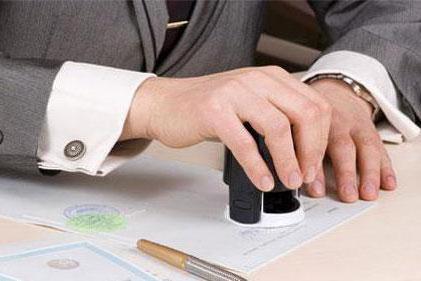In the process of life, we often encounter all kinds of changes and difficulties, for example, a change of residence, illness, moving, selling or buying a new house in a neighboring city, buying a car, a business trip, etc. In such cases, it may turn out that you need legal assistance, for example, to represent our interests in various structures and organizations.
To accomplish this, a special document is required, namely, a power of attorney. What is she like? What powers of attorney require notarization? And what notarial documents do exist? Let's try to figure it out.
Basic concepts
According to the first paragraph of Art. 185 of the Civil Code of the Russian Federation by power of attorney is the so-called authorization issued in writing, which is issued by the person represented by the other, namely to someone who will observe the interests of the originator of such a paper. This is done so that the representation of citizens' interests becomes possible before third parties, in particular during their absence.
Represented - individuals, that is, citizens of the Russian Federation, who are entitled to issue trust documents in the event that they are fully capable. Recall that holders of full legal capacity are considered to have reached the age of 18 years. In addition, these include those who are in the age group of 14 to 18 years old, but have already acquired legal rights in situations provided for in Articles 21 and 27 of the Civil Code of the Russian Federation. An example is the situation when a minor is recognized as legally competent, according to the decision of the guardianship authority, board of trustees, or court. Why do I need power of attorney certification?
Citizens in the age group from 14 to 18 years of age who have legal rights are still not fully able to still issue power of attorneys, but only within the framework of permissible transactions permissions for them.
In particular, it is possible to issue a notarized power of attorney for adolescents aged 14 to 18 in the process of transferring powers that they can perform independently, this is discussed in the second paragraph of Article 26 of the Civil Code of the Russian Federation. For empowerment to carry out legal transactions, certification of power of attorney can be made only with the written permission of their representatives under the law, namely: parents, guardians, or adoptive parents, etc.
Powers of attorney on behalf of adolescents, as well as on behalf of incompetent citizens, are issued by their legal representatives.
The procedure for certifying a power of attorney by a notary will be discussed below.
Classification of powers of attorney
There are several types of powers of attorney:
- The first type is a one-time power of attorney, which is issued in order to fulfill a specific task.
- The next type is a special power of attorney, it is needed to perform periodic operations, depending on the situation.
- And one more type - the general power of attorney. This type of document is executed in cases when it is required to transfer powers to a legal or physical person in full and without restrictions. An example is the transfer of vehicle control. The notarization of powers of attorney is not always required.
Assignment of power of attorney
According to the law, a trust document can be issued by both individuals and legal entities. They are executed by authorized representatives on behalf of the institution. As a rule, these are lawyers or financially responsible employees. Organizations often issue employees with power of attorney to receive bank deposits, finances from the principal's account and correspondence. The state duty for certification of power of attorney is paid without fail.
Individuals are empowered with the right and ability to issue:
- Confidence document for salary;
- general power of attorney for property management;
- driving a car;
- to receive pensions, scholarships and allowances;
- to use a deposit in a bank;
- baggage claim;
- to receive various payments related to labor relations.
In what cases is certification of powers of attorney necessary?
Is it really necessary to certify a power of attorney with a notary?
According to the current Civil Code, at the moment most of the documents can be made in ordinary written form, and notarization of powers of attorney is not required.
Be sure to certify those of them that need to be executed in a notarized form, namely: pledge, rent, assignment or transfer of debt agreements.
What should I know when compiling a power of attorney?
Each power of attorney requires notarization and is issued to the client by a notary in a single copy. It can only be aimed at the implementation of lawful actions.
The power of attorney contains information about the place, date of its commission, validity period, necessary information about the person (name, citizenship, passport details, address). All acquired powers are reflected in the power of attorney clearly and clearly, with the absence of a double meaning and, of course, they should be legitimate. This is confirmed by the general provisions on the power of attorney.
Anyone who acts as a representative of the document is obliged to personally fulfill all the powers that are intended for him on paper. However, he is entitled to transfer the right of the representative to transfer his rights to another person. In this document, you can direct all the powers, as well as separately selected items. Each such paper, the transfer of which takes place as part of the procedure, must be certified by a notary.
Validity period
The full term of the power of attorney may not exceed more than three years. In those cases when the term is not indicated in it, it will be valid only for one year from the date of its execution. The period during which the power of attorney is considered valid, if it was issued in the framework of the reassignment, cannot exceed the validity period of the main trust document.
Mandatory notarization of power of attorney is prescribed by law.
Do not forget that the one who concludes such a document has the right to cancel the action of the paper at any time, and his representative can also refuse it at will. In cases of termination of the power of attorney, the owner of the document is required to notify the representative and any third parties. The actions taken by the representative before he knew or should have known about the cancellation of the paper are considered legitimate.
Power of Attorney Procedure
An explanation of the need for procedures and actions, including notarization of power of attorney, is reflected in the legislation of the Russian Federation. Such an action directly consists in entering the signature of the authorized person in the original of the trust document.
Generally speaking, a power of attorney must be certified by a notary public at the conclusion of an agreement in cases where:
- it is determined by federal legislation of the Civil Code of the Russian Federation;
- this is dictated by the wishes of such certification by one or both parties at once.
For example, there is a notarized power of attorney to represent interests.
Considering the situation in particular and in detail, certification of powers of attorney by a notary is considered mandatory in the following cases:
- obtaining a loan secured by purchased real estate;
- Fulfillment of a lifetime maintenance or annuity agreement;
- registration of a marriage contract between persons who enter into marriage;
- drafting a written testament regarding the fate of all property in the event of the death of a person;

- transfer to use the vehicle to another person;
- execution of a trust document for the transfer of authority either for a specific one or for a number of variations in order to ensure the sale of a house, apartment, cottage, etc.
- compilation of mortgage bonds;
- an agreement to redirect debt to another person;
- agreement on the issue of child support.
This confirms Art. 185 of the Civil Code of the Russian Federation.
The essence of the power of attorney
What is the main essence of the power of attorney? The main duty of a notary public is to comply with all necessary and statutory rights. Therefore, it is precisely in this direction that the state body regulating legal relations acts, since the certification of a document reliably guarantees all persons who enter into legal relations their safety in the field of any legitimate interests. In ordinary practice, this is manifested in such a way that when ambiguous moments arise in the field of legal relations, supported by a notarized document, they are resolved without court intervention on the basis of the often encountered principle of “executive inscription”. To do this, you need to contact a notary for help. This practice gives citizens the opportunity to save their time, money, and most importantly, it is not at all necessary to go to court and burden themselves with lengthy proceedings.
Among other things, an experienced professional practicing certification of documents examines in detail all the necessary papers and announces his interpretation regarding the legality of the agreement before signing the document submitted for certification. He carefully monitors the observance of the rights of both parties and checks the accuracy of the specified data. If necessary, the notary is entitled to organize a short consultation on the subject of legal relations, as well as to warn of all possible undesirable consequences of concluding an agreement. Will give recommendations on certification of powers of attorney.
It is important to note that the services of a notary in document certification are often, as a rule, done with the maximum comfort for your client. In view of the fact that all the questions and tasks that arise are resolved on the spot, it is no longer necessary for the citizen who has applied to look for the opportunity to take advantage of any other organizations. In cases where the notary will need any additional information or documents, he will get them on his own.
It is equally important that when certifying a document, a corresponding mark confirming this is put in a special registration journal. In case of loss of the original power of attorney, it can be duplicated, for this you should contact a notary organization, since all important information is stored in archives for a rather long period of time.
In what cases is a refusal of a power of attorney possible?
A notary may refuse to perform a notarial act when:
- contradictions to the law;
- the need for an action by another notary;
- incapability of a citizen or if his representative applied without the necessary authority;
- a transaction made on behalf of a legal entity that is contrary to the objectives that are specified in its charter or regulation;
- documents submitted for notarial acts that do not meet the requirements of the law.
Other types of trust document
As mentioned above, trust documents giving the right to carry out transactions in the interests of their originator require mandatory notary certification. But, despite this, there are a number of cases where the participation of an authorized employee who takes on the role of a witness is also considered possible. In such a situation, certified paper will be considered equal to a notarized document.
Here is a short list of those types of powers of attorney that are comparable to notarized documents:
- Confidential paper of a person who is in fixed-term or professional service at locations where there are no notary organizations. This type is certified, as a rule, by the bosses;
- paper, which is certified by the chief physicians, as well as the heads of medical structures and institutions;
- power of attorney, which was issued to a person serving his sentence in the framework of imprisonment. This document is certified by the head of the correctional facility;
- document of a legally competent person who has reached the age of majority. In this case, the document can be equated with a notarial one if the citizen is in special institutions under the supervision of the social protection of the population.
Individuals are empowered in the usual way to draw up letters of trust for disposing of movable and immovable property, to use a car, receive wages, various payments, as well as to receive scholarships and allowances and pensions.
In addition, there are also universal in nature trust papers that can be signed by both legal entities and individuals. They are equated, for example, with power of attorney to obtain the right to appear in court on behalf of another person as his representative. As for the processing of such documents, thanks to modern legislation, they can be certified in typewritten and in a more familiar, handwritten form.
Whenever a power of attorney is not certified by a notary public, a citizen is always given only one copy of this document. Her extradition should not be associated with all kinds of illegal actions. The list of information that must be included in a trust document is a fairly wide list. So, for example, you need to enter there: the place and date of certification of the document, its validity, any information that characterizes the person, as well as other formalities.
Financial component
For carrying out work on the certification of powers of attorney, the notarial nature of which is not required by the legislation of the Russian Federation, the notary has the right to charge a tariff of 200 rubles.
In addition to the notarial fee, when implementing the power of attorney certificate, the notary office can take a fee for the provision of technical and legal services.
We talked about which powers of attorney require mandatory notarization.